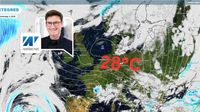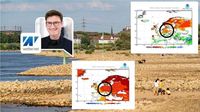Germany is bracing for an unusually warm and dry April, with meteorologists expressing serious concerns about the potential for drought conditions reminiscent of previous years. According to Dominik Jung, a diploma meteorologist from wetter.net, the upcoming weather in North Rhine-Westphalia (NRW) is being deemed "extremely unusual for this time of year." As March comes to a close, the forecasts indicate a significant shift in weather patterns that could have far-reaching implications for agriculture and the environment.
The latest predictions suggest that a stable high-pressure system will settle over Central Europe starting March 31, 2025, lasting potentially for at least 10 to 14 days. This weather pattern is expected to bring plenty of sunshine and little to no rain, with temperatures soaring as high as 28 degrees Celsius—more typical of June than April. Jung notes that such a dramatic increase in temperature could lead to new records for this time of year.
"The April forecast is getting worse and worse," Jung stated, emphasizing the alarming nature of the situation. He pointed out that the American weather model GFS has shown a consistent trend of warm air masses moving from the southwest, which is highly irregular for the spring season. This scenario could result in numerous days with temperatures exceeding 25 degrees Celsius during the first week of April.
Adding to the urgency, Jung highlighted that the current weather situation follows a pattern reminiscent of the hot summers of 2018 and 2019, where dry conditions in the spring led to severe droughts later in the year. "If the high-pressure influence continues to dominate, Germany is at risk of facing a harsh drought and hot summer," he warned, indicating that the parallels to those extreme years are becoming increasingly evident.
As the forecasts become more alarming, the implications for agriculture cannot be ignored. Jung cautioned that without sufficient rainfall in the early part of spring, crops could suffer significantly. "We could be facing another drought period like we saw in 2018 and 2019, which had devastating effects on soil, harvests, and water supply," he explained.
Currently, soil moisture levels in parts of NRW are already concerningly low. The Drought Monitor from the Helmholtz Centre for Environmental Research indicates that some areas are experiencing significant dryness, raising alarms about the soil's ability to support crops if these dry conditions persist.
In light of these developments, Jung's analysis suggests that while many may welcome the sunny and warm weather, the long-term consequences could be severe. "Such stable weather patterns with weeks of dryness and early summer warmth are extremely unusual for this time of year," he reiterated. The first weekend of April is projected to see temperatures reaching up to 20 degrees Celsius, with the possibility of further increases thereafter.
Interestingly, the GFS model's predictions have been remarkably stable, which is not typical for long-term forecasts, suggesting that the likelihood of experiencing this unusual weather pattern is increasing. If this trend continues, Germany could be in for an April that feels more like summer, raising concerns about the potential for a new heatwave.
Jung further elaborated on the potential for a "supersummer" in 2025, as current weather models indicate a persistent high-pressure system that could lead to extreme heat conditions. "If the dry weather continues into May, we could see temperatures surpassing 40 degrees Celsius again," he warned. This scenario would not only impact human activities but could also have dire consequences for natural ecosystems and infrastructure.
As the weather becomes increasingly unpredictable, the question remains: how long can nature withstand this dry stress? Jung's concerns echo a growing unease among climate scientists regarding the sustainability of weather patterns in the face of climate change. The current trajectory hints at a summer that could challenge previous records for heat, with significant implications for water resources and agricultural productivity.
In summary, as Germany prepares for an April marked by unusual warmth and dryness, the warnings from experts like Dominik Jung serve as a crucial reminder of the potential impacts of climate variability. The upcoming month could set the tone for the rest of the year, and the stakes are high for both the environment and the economy. As meteorologists continue to monitor these developments closely, the call for proactive measures to mitigate the effects of potential droughts becomes ever more pressing.






